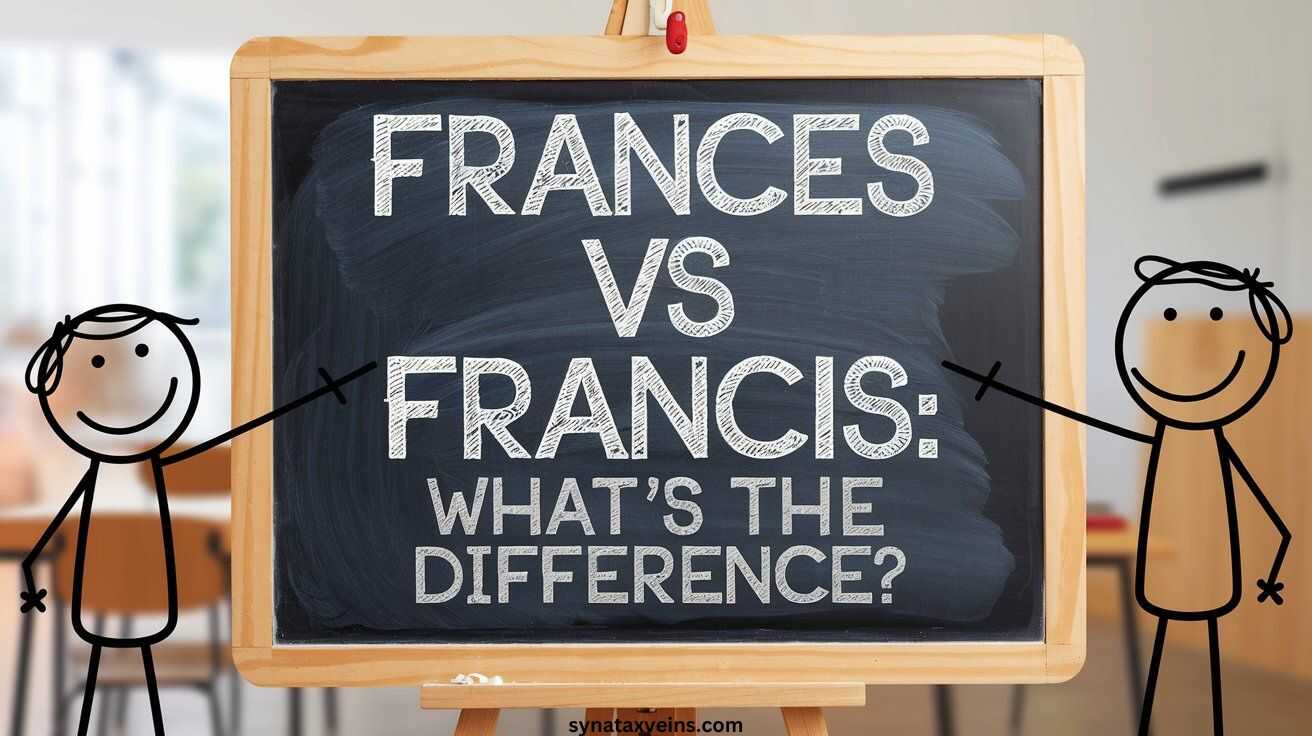Names have a way of carrying deep meanings and cultural significance. Frances vs Francis is a perfect example of how seemingly similar names can have distinct differences. Both of these names stem from the Latin name origin of Franciscus, but their usage has evolved in different directions.
Francis is used for a boy, while Frances is typically used for a girl, creating a noticeable gender distinction. Despite this, confusion persists due to semantic ambiguity, spelling differences, and historical references. In this article, we’ll explore the difference between Francis and Frances, their cultural meanings, famous figures, and provide some useful examples to clear up any confusion.
Quick Summary
The most fundamental difference between Francis and Frances lies in their gender associations. Francis is traditionally a boy name, often linked with prominent famous figures like Pope Francis and Saint Francis of Assisi. On the other hand,
Frances is a girl name, often associated with figures like Frances Burnett and famous literary references. However, name confusion can arise due to their shared Latin roots and similar pronunciation, which sometimes leads to name identification errors or misspellings.
Understanding Frances vs Francis
At first glance, Francis and Frances might seem nearly identical, but they have distinct roles in both language and culture. The name Francis comes from the Latin Franciscus, meaning “Frenchman” or “free one,” and has historically been used for boys. Frances, while also stemming from the same root, is generally a female name, gaining popularity through figures like Frances Burnett and in literary circles. The cultural impact of these names is clear, with Francis often connected to figures like Saint Francis, the patron saint of animals, and Pope Francis, the current Catholic Pope.
Frances: Definition and Usage
The name Frances carries a touch of elegance and sophistication. Its roots in Latin have made it a timeless choice for many parents, and it’s particularly favored for girls.
The name Frances has historical references, with famous namesakes such as Frances Elizabeth the middle name of the iconic American author, Frances Hodgson Burnett. It’s known for evoking a sense of nobility and refinement. In terms of cultural meanings, Frances has always maintained a refined reputation, perfect for those seeking an elegant name with cultural significance.
10 Synonyms for Frances
If you’re considering the name Frances, you might also explore variations such as:
- Francesca
- Francine
- Francina
- Franca
- Fanny
- Franziska
- Francesca Elizabeth
- Fay
- Francesca Marie
- Francesca Louise
These name variations are all derived from the same root, offering different options for parents seeking a name with Latin roots that still carries the elegant, timeless vibe of Frances.
Word Confusion: Frances versus Francis
The word confusion between Frances and Francis is mostly due to their similar spelling and phonetic closeness, yet they’re distinct names with gendered associations. It’s easy to mistake one for the other, especially in writing, where a small spelling mistake could change the entire meaning.
When you write Francis, you’re likely referring to a male name, while Frances refers to a female name. Understanding these subtle differences can help clarify their orthography and the importance of proper noun categorization in language.
Exploring Later…
Now that we’ve addressed Frances in-depth, let’s shift our focus to Francis—a name with even deeper historical and cultural roots. Hold on for more insights!
Francis: Definition and Usage
Francis has a long and distinguished history. Derived from the Latin Franciscus, the name has always been associated with strength, freedom, and a connection to French culture. Historically, Francis has been used primarily for boys, and it’s deeply linked to famous figures such as Saint Francis of Assisi and Pope Francis.
Saint Francis is known for his devotion to simplicity and service to God, which makes Francis not just a name but a reflection of a humble, spiritual life. The association with Pope Francis further solidifies its Catholic and spiritual significance, as his papal name symbolizes blessing God and the pursuit of a life dedicated to the welfare of others.
READ MORE >>> Grateful or Greateful: What’s The Difference?
10 Synonyms for Francis
If you’re thinking about names similar to Francis, here are 10 great alternatives:
- Francisco
- Frank
- Francesco
- Franco
- Frankie
- Francisc
- Franz
- Francie
- Fran
- Francesco Paolo
These name variations reflect the flexibility and global appeal of Francis, which is used in various forms across different cultures, including Francisco in Spanish-speaking regions.
Word Confusion: Frances versus Francis (Continued)
The confusion between Frances and Francis often stems from similar names and the way they’re pronounced. While Frances is typically reserved for girls, and Francis for boys, some might mistakenly interchange them due to their close resemblance.
It’s essential to remember that these are gender-specific names, and using the correct one in context helps prevent mistaken identity. Whether writing a letter, choosing a name for a character, or calling someone by their proper name, keeping this distinction clear is key.
Exploring Late
Naming trends today still draw from the historical legacy of Francis and Frances. Cultural names continue to carry meaning beyond their literal interpretation, representing social and historical values.
Frances may evoke an elegant vibe, while Francis often symbolizes blessing or a life devoted to serving God. The world of names is rich and complex, and understanding these semantic differences can deepen our appreciation for language and history.
Resources for Frances vs Francis
If you’re looking to dive deeper into the origins and meanings of these names, check out resources like:
- Baby name websites that detail the name origin and meaning of both Francis and Frances.
- Historical references to Saint Francis and Pope Francis for insights into the cultural impact of these names.
- Cultural significance articles that explain the naming conventions across different societies.
Side by Side Comparison
Here’s a side-by-side comparison to help visually highlight the differences between Francis and Frances:
| Category | Francis | Frances |
|---|---|---|
| Gender | Male | Female |
| Origin | Latin, from Franciscus | Latin, from Franciscus |
| Famous Figures | Saint Francis, Pope Francis | Frances Burnett, Frances Elizabeth |
| Cultural Significance | Catholic, spiritual symbolism | Elegant, refined, literary roots |
Everyday Usage Examples
To put this all into perspective, here are some everyday usage examples:
- Francis is the name of Pope Francis, who advocates for humility and simplicity in the modern world.
- Frances could be a character name in a novel, like Frances Burnett, an author known for works like The Secret Garden.
By understanding the gender-specific nature of these names, we can avoid name confusion and use them more appropriately in conversation or writing.
Frequently Asked Questions
1. What is the difference between Francis and Frances?
The main difference between Francis and Frances lies in their gender associations. Francis is traditionally a male name, most famously associated with Saint Francis of Assisi and Pope Francis, while Frances is a female name, often linked to historical figures like Frances Burnett. Both names come from the same Latin roots, but their usage differs based on gender.
2. How do you spell Frances for a man?
The male version of Frances is spelled Francis. While both names have similar Latin origins, Francis is the form used for boys, and Frances is the common spelling for girls.
3. Is Francis gender neutral?
No, Francis is not considered gender neutral. It is traditionally used as a male name. The confusion sometimes arises due to the similarity between Francis and Frances, but Francis has always been associated with men, while Frances is the female counterpart.
4. Is Francis spelled with an I or E?
Francis is spelled with an I. The I is the standard spelling used for the male name. If you’re referring to the female version, it is spelled Frances, with an E.
5. How do you spell Francis in French?
In French, Francis is spelled the same way as in English, Francis. It comes from the Latin name origin Franciscus, which means “Frenchman” or “free one.” The name is commonly used in both English and French-speaking countries.
6. Is Ann spelled with an E?
No, Ann is typically spelled with two N’s, without an E. However, there is a variation Anne, which includes an E. Anne is a more common spelling in some cultures, like in French, while Ann is widely used in English-speaking countries.
Conclusion
In conclusion, while Frances vs Francis may seem like a simple question, there’s more to these names than meets the eye. They carry with them a rich history, gender distinctions, and deep cultural meanings. Whether you’re naming a child, writing a story, or simply learning about names,
understanding the difference between these two can help you avoid mistaken identity and bring clarity to your name categorization. Embrace the beauty of both names and appreciate their individual historical context, ensuring each one shines in its own right.

